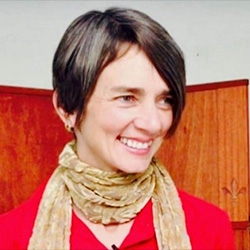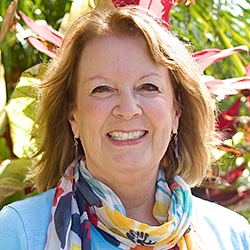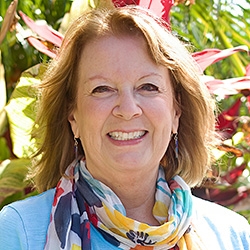

Search Results: experiencing
-
This is an opportunity to explore/transform a limiting belief you have about yourself using what science is discovering about neurobiology. A limiting belief is simply an idea or thought we have about ourselves/life that we or others have affirmed over and over again – these ideas usually get in the way of living life fully.
-
Even leaders we admire may exhibit behaviors that could be labeled as abusive, at least slightly. This includes not treating followers as equals, using charm, and hiding or twisting truth. In such scenarios a key reason for this is loneliness. If we're using our work and position primarily to gain for appreciation, acknowledgement, and acceptance then we need to examine our own loneliness. We need feedback to keep such conduct in check.
-
Exploring how stories and unmet needs each influence the cause of our feelings in NVC.
-
The focus of this 6-session class is on shifting the intention of your teaching from how to why while embodying the principles and practice of NVC every step of the way - from planning to delivery. The methodology Miki offers is to start with understanding what the people in your audience face in their environment, continue with what they might want to learn and how NVC principles can provide them with what they want, and end with how you can frame the principles in a language and context that speak to your audience’s familiar experience.
-
Join Susan Skye as she guides you to experience profound transformation of the inner jackal messages resulting from childhood trauma. Discover how the limbic system of the brain works, and transform jackal messages stored there with compassionate connection.
-
Much like other asymmetric relationships (such as therapist and client), there are complications related to power dynamics that can arise with any NVC trainer having sex with a participant. For one, there's (counter)transference. And there's potential for things that may not move outside this asymmetric relationship -- such as projections where the participant, and/or the trainer, is guided by un-healed pain of their "inner child".
-
Grief is often confused with anguish. Anguish is a painful feeling that comes along with deep resistance to an experience or truth. Grief that leads to healing is an expansive state. It is a willingness to be with an experience and truth. If you're not resisting grief, then it's a neutral-to-pleasant experience. Pleasant sensations can include a sense of space and relief as something is integrated and tense holding releases.
-
Here's a daily self-acceptance practice you can bring into your life whenever you are experiencing pain, tension, contraction, lack of fulfillment, or unmet needs or values. Giving your often undesired experiences space can be a path to greater inner connection and peace.
-
Join CNVC Certified Trainer and Certified Focusing Teacher Shulamit Berlevtov in this brief exercise called the Wheel of Awareness. This exercise will help you become aware of how to distinguish and differentiate your life experience.
-
This exercise brings forth presence, awareness, and witnessing regarding what you observe. And also the inner form of experiencing: thinking, feeling, sensing, longing, and noticing any inner resistance. This exercise is designed to allow self-compassion to clear the inner space, and to help you feel it as a flow of energy, presence to the other, and bring in a more relaxed experience and more availability to vulnerability.
-
2020 has added three major global crises to our long and painful list of ongoing challenges:
- Public health crisis emerging from the Coronavirus infecting humans;
- Governance crisis manifesting especially in global protests against police brutality and governments more generally; and
- Economic crisis unfolding from responses to the pandemic.
And as a result, many of us who share NVC with others have been feeling a growing unease about our roles. I have heard from quite a few who want to go beyond using NVC primarily as a personal growth tool within the market economy, and often don't know how to do so. This course is designed to respond to this need by supporting anyone who shares NVC with others – regardless of experience or certification – in opening to the way systemic perspectives deepen and transform how we bring NVC to people, communities, and organizations.
-
The human brain is a conservative organ that comprises different systems with varying degrees of conscious awareness, which evolved in three basic stages of human history (the lizard-squirrel-monkey brain.) In my understanding, we could say, the brain has strong needs for understanding, order, predictability and meaning. In fact, one of its key functions is to process experiences, and predict what the world is like, in order to maximize survival. CNVC Certified Trainer Stephanie Bachmann Mattei explores the biological basis of our inner jackal voices.
-
Trainer Tip: Is there something you would like more of in your life right now? Try not to look to other people to provide the kind of experiences you want. Can you think of a way that you can be the change you seek? See if responding to the people the way you would want them to respond to you shifts something. Read on for an example of how.
-
How can we live up to our true potential, a life filled with relationships and experiences that truly meet our needs? In this article, Mary offers us a way to bring about inner transformation that can lead to seeing ourselves, others and life differently -- for greater agency, empowerment and choice.
-
For this exercise choose a situation in which you have said a “yes” to someone‛s request but you didn't experience your “yes” as given freely or joyfully. Then explore judgements, feelings, needs, and alternate strategies that come up in relation to your “yes”, your “no”, and in relation to what the other person might be experiencing.
-
Ask the Trainer: Is a confidentiality agreement typically used in NVC practice groups?
-
When a person of color (A.K.A. a person from the Global Majority, or GM) tells a marginalization story that triggers a defensive response from a white participant in a group, to foster awareness and healing, leaders can address the white person's distress with empathy, highlighting the common dynamic of prioritizing white pain. From there, leaders can offer GM participants opportunity to share their experience and make requests of the group.
-
- Do you know what is yours to do in response to our growing global crises?
- Is nonviolence woven as deeply as you want it into how you live and lead?
- Have you ever experienced what it’s like to participate in an interdependent web of mutual support to fully embody our commitments?
- Are you familiar with how to bring yourself back again and again to aligning with purpose in every moment?
- Do you see yourself as part of transforming the legacy of scarcity, separation, and powerlessness into a livable future?
-
Susan Skye unpacks the need for respect, offering clarity for requests and personal experience.
-
Being put on the spot or confronted in an unexpected way can be an unpleasant experience to have. Even more so during lockdown when meetings are held on Zoom.
In Life Hack 35 we're exploring the feelings that come up from hearing a difficult message as well as ways you can respond. Esme recently had this experience and offered to record a one on one session with Gesine to explore the situation.

Quick Links
Subscription Preferences
Stay In Touch!
Looking for ways to keep up with NVC Academy news, get special offers, free resources, or words of inspiration? Here are five ways to stay engaged:



















